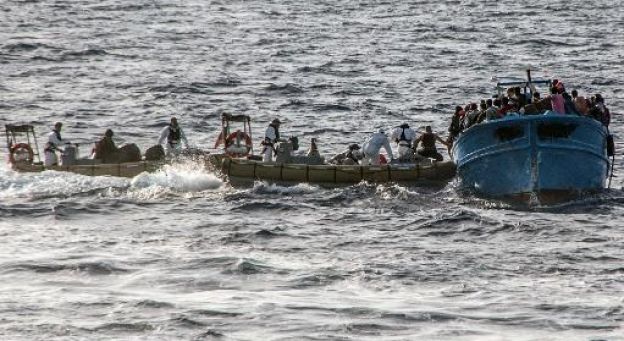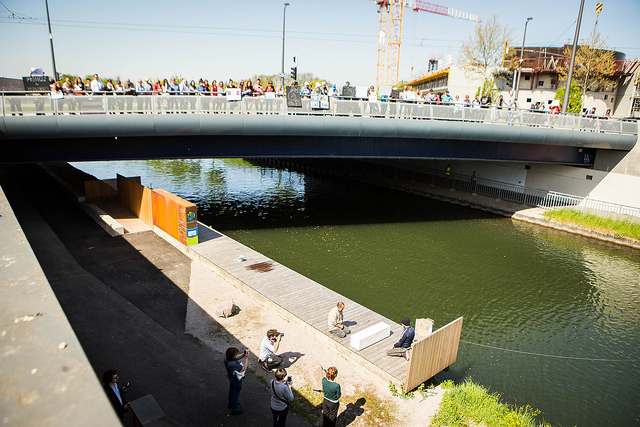Rescue at sea and the right to asylum… UNHCR's responses

(BRUXELLES2 Interview) What happens to the many migrants picked up at sea if they apply for asylum? B2 asked Madeline Garlick, senior adviser in the Europe office of the United Nations High Commissioner for Refugees (UNHCR), for her opinion. An interesting opinion that puts "the church in the middle of the village" in the midst of a controversy over the reception of migrants and refugees in Europe and discussion on a possible major Frontex operation. Opinion all the more crucial as this subject (migration) will be on the agenda of the European Summit next week...
• Once rescued on a boat, what becomes of the migrant?
All captains have an obligation under the international law of the sea ... to come to the aid of a ship in distress and to rescue anyone in need. They are then obliged to take her to a “safe place”. The sea is divided into [so-called] “search and rescue” zones, the responsibility of which is assigned to different states – usually the state whose coasts are near the zone. Since the State is responsible for the area in which the person is rescued, it is obliged to facilitate disembarkation on its own territory or in another neighboring State.
• If the migrant is picked up by a “state” ship, what happens in the event of an asylum application?
If a person is rescued by a government ship — be it Coast Guard, Navy forces, etc. —, the State will be considered, in most cases, to have "jurisdiction" over the person. This means that he is obliged to ensure that she is not again threatened with persecution. In other words, if the person applies for asylum, the State is obliged to ensure that he (or she) has access to a territory where his or her application for asylum can be examined. This right has been confirmed by the European Court of Human Rights (NB: judgment Hirsi Jamaa and others against Italy in 2012).
• What if it is a private boat?
In this case, it's slightly different. The captain of the ship is still required to rescue and bring the person to a safe port and close to the area. But the flag state of that boat is not necessarily or automatically responsible. Because, on a private boat, it exercises neither its competence nor its control over people. Normally, the authorities of the country, where the disembarkation takes place, should process the asylum application. (…) This situation poses a problem when the country of disembarkation does not have an asylum system and when there is no guarantee that fundamental rights are respected. This is the case in Libya. It is for this reason that UNHCR opposes the disembarkation of survivors in this territory, when there is another option, i.e. a safer port, where the people rescued can be assured that their rights are respected.
• During an operation coordinated by Frontex, can the migrant apply for asylum?
In such a case, States remain bound by all international and European obligations towards the rescued refugees and asylum seekers. The "Frontex" agency is not a State and therefore cannot be held responsible, in law, for any breach of fundamental rights. Thus, masters of vessels from participating Member States must act in accordance with their obligations, and must ensure that rescued asylum seekers can be disembarked. And, in a place where their asylum claim can be determined and assessed fairly.
• In what legal framework does Frontex fit then?
All Frontex operations and activities are governed by its founding regulations, which are subject to European and international fundamental rights and the right to asylum, including the rights set out in the 1951 Convention relating to the Status of Refugees. The 1951 Convention binds all EU Member States and is affirmed in its treaties.
The Frontex Rules Preamble, as amended in 2011, explicitly provides that the Rules: "respects the fundamental rights and observes the principles recognized in particular by the TFEU and by the Charter of Fundamental Rights, including (...) the right to asylum, the principle of non-refoulement, the principle of non-discrimination (... Any use of force must comply with the national law of the host Member State, including the principles of necessity and proportionality.”
• Which means ?
That means that there is no conflict or competition between international and European obligations - Frontex and all states taking part in operations coordinated by the agency are required to fully respect the protection of refugees. This respect takes precedence over the border control provisions, specified by the European Union's "Schengen Borders Code".
(comment collected by Loreline Merelle)
Read also:



